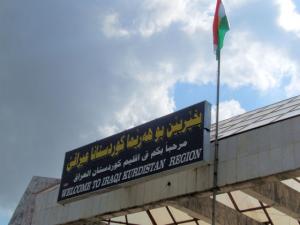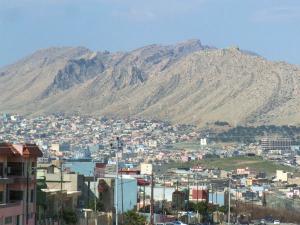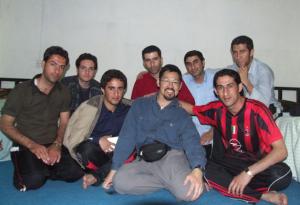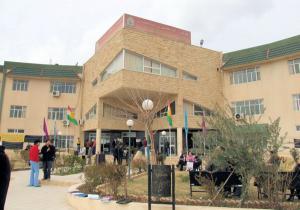My introduction to what most people think is one of the most unstable countries in the world
“Why do you want to come here?" the immigration officer at Habur asks for the second time. Once again I explain my interest in visiting Kurdistan, which prompts a repeat of the second question. “Do you know anybody here?” I respond by telling him that I do not know anyone, but only want to see a bit of northern Iraq and hopefully, have the opportunity to experience the kindness and hospitality of Kurdish people.

The officer then makes what turns out to be a lengthy telephone call. I sit in the modest-sized border building that has a television, a water dispenser and a somewhat relaxed decor. Finally, the decision is made that I must talk with the Chief of the Immigration Office; one of the border guards accompanies me to the nearby building. A self-assured, well-dressed official welcomes me and curtly orders one of his assistants to fetch me a cup of tea (standard Kurdish courtesy). He repeats the same questions; I provide the familiar answers. He says he is only interested in finding out if my visit to Kurdistan is trouble free; he gives me his phone number in the event of any difficulties.
Is it safe?
It is possible to have an incredible cultural experience in Kurdistan. Safety is obviously a concern, but locals will point you in the right direction. They will urge you to avoid Baghdad and Mosel; not areas I am inclined to visit. Thankfully, Kurdistan is not host to the same violence that inflicts southern Iraq. The Kurdistan Regional Government has organized its renowned fighting forces (the peshmerga) into an army that ensures terrorists are not able to easily enter the area. Of course, tensions with Turkey still exist; currently manifested as verbal political sparring.
To maintain a safe atmosphere, there are frequent highway checkpoints; all vehicles are stopped, identification papers checked and searches conducted. Since foreign travelers are still not common, such stops can be more protracted than normal; soldiers consult with one other, flip through “unusual” passports and jokingly speculate why a foreigner is in Kurdistan. These are minor inconveniences for locals, who view these precautions as necessary.
Life as an Iraqi university student
Dohuk is the first major city from the northern Turkey-Iraq border crossing; it is situated at the base of a finely laminated rocky hillside. Other than a somewhat interesting downtown market, it may appear to have little to offer. For me, this small, bustling city shows an interesting perspective into Kurdish culture and life, made possible by the relative friendliness of some people I meet on the streets. Of particular note is a young university student named Nawzad, who eventually asks if I'd like to meet some of his classmates. Since I work in the field of education and curious about the Kurdish system, I eagerly accept. The two-story residence is close to the market; typical of a student dormitory building.

Nawzad's room is austere, with a thin carpet and a bed for each student. A few towels and shirts hang from hooks; on closer inspection, small piles of clothing can be seen on the floor at the head of each bed. Nawzad digs under his bed, pulls out his repertoire of books and photocopies sheets that serve as proof of his student status. Flipping through a thick package of photocopies, I scan the pages from a university textbook describing the details of poetry. The content is clearly academic. As a first language English speaker, I find it is not an easy read. How do they get through this, I wonder. The material is clearly not for second language learners of English. Nawzad listens intently; his youthful desire to learn is clearly evident as I explain why even Canadian teacher candidates would struggle with his readings.
Word spreads of my presence at the dormitory; the room fills up. Even those who do not understand English very well, are curious and listen intently as I converse with a number of their mates. I learn that many of these second- and third-year university students are enrolled in the teaching program. They want to know my thoughts on Kurdistan; I want to know about their education curriculum. As I talk about the possibilities of tourism in Kurdistan, which is supported by the friendly nature of the Kurdish people and the scenic landscape, I can tell they are delighted to hear positive comments about their country.

I am asked about possibilities for studying abroad; I explain a little about what would be involved for foreign students to attend a Canadian university. It soon becomes apparent that despite the pride they feel for their region and culture, these students still believe a successful future lies outside their country – Europe, or North America.
Life Under Saddam
These are young men in their early 20’s; they have incredible stories about their experiences under Saddam Hussein. Sarbast, the leader of the dormitory group and best English speaker (from working as a translator for the American army), recounts his memories of a refugee camp in Turkey. As young children, many had to walk long distances, fleeing to Turkey or Iran. It explains their general attitude of disdain towards Saddam and "the Arabs". This is especially evident when our conversation turns to a discussion of the tragic and horrendous use of chemical weapons that Saddam used on the population of Halabja in 1988.
At one point, Sarbast unexpectedly asks, “How old would you say I am?” I am taken aback by this question, not really certain why he is asking. After hearing my measured response, he points out that he and his classmates all appear old, due to the stress in their lives. As I look more closely at them, I realize they do appear 10 years older than their age. Whether their premature aging is a result of stress, or other factors is difficult to say. However, I do understand their life experiences have definitely been much harder than anything I have been through.
Developing relationships on an Iraqi university campus
The students are keen in hearing my ideas about their university courses. Sarbast, in particular, asks "Is this what teachers in Canada have to know and how they are taught?" He shows me his poetry, grammar and drama texts and explains what goes on in his classes. I have to admit, the readings and the pedagogical techniques seem different from a Canadian teacher education program, but I remind him the teaching program at Dohuk University is still new.
Ultimately, I am to visit their university and sit in on their classes. I jump at this chance. What an experience!

The first thing that strikes me is the way the female and male students automatically segregate themselves. This surprises me since many of the women wear makeup, are dressed in stylish clothing complete with black, lace-like leggings and provocative high heel boots. The majority wear head scarves, though. Still, I thought a university setting would be more progressive. Even within the cafeteria, interaction between female and male students is limited. When I mention this to Sarbast, he smiles and says, "But with you here, we now have a good excuse to talk with the women."
This comment underlies an observation I made since arriving in Kurdistan. So to on the streets, it is unusual to see women. This led me to ask, "How do men and women meet and develop relationships?" Sabast admits it is not easy. He describes a process that reminds me of high school. Other than the case where parents make arrangements, an intermediary (usually a friend of the boy) makes the initial contact with the girl and presents his "client" in the best possible manner. If the girl is interested, she passes on her cell number and initial contact is made. Then there are many phone calls, arranged public meetings and eventually, more private rendezvous. It seems to work.
The Onset of Change
Between classes, I chat with some of the female students; I am curious to hear their ideas of a possible changing role for them in Kurdish society. They seem content in their social status. This may reflect the progress already made. This is the same feeling Sarbast voices when he says, "Change will occur in Kurdistan – slowly and over time."
After having spent a few days with this dynamic, dedicated and inspiring group of potential teachers, I cannot help but think that positive changes are happening; a reason to feel optimism about the future of Kurdistan, Iraq.